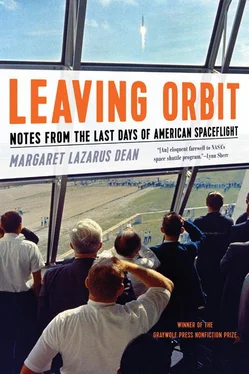I’ve never been a believer in privatized spaceflight—getting to space as cheaply as possible with an emphasis on catering to paying customers only serves to rob spaceflight of the things I love most about it. But I started to notice how many of my space friends—people I would have thought would be NASA-only snobs like me—were getting excited about the SpaceX launch, were posting updates about it online and making plans to come out for the launch. The NASASocial (the new, more inclusive name for NASATweetup) organized around this launch seemed to engender more chatter than many of them in the past. SpaceX has established a significant launch operation here in Florida but isn’t hiring many ex-NASA people. The rumor is that the company doesn’t want workers who have been steeped in NASA culture, especially NASA’s extreme concern for safety (and, I can’t help but cynically suspect, the relatively high wages, solid job security, and generous benefits of government contractors). If Omar were somehow to get hired at SpaceX in spite of this bias, it would likely be with a cut in pay and certainly a cut in benefits.
I found myself wondering what this launch was going to be like, how it would be different from shuttle launches both in terms of the rocket itself and in terms of the social experience of seeing it. A lot of the space fans I know are laid-off, or soon-to-be-laid-off, shuttle workers. What would this launch experience be like for them?
So I started making plans to go. Thankfully, this launch fell after the end of my semester and before my son’s preschool ends, a quieter time than usual at my house and less disruptive for me to be gone. Still, the number of trips beyond the “definitely last one” is now three and growing, which is lost on neither my husband nor me.
Today’s launch is scheduled for 4:55 a.m. Unlike the shuttle, the SpaceX Dragon has an “instantaneous launch window,” a phrase whose implications I don’t care for. Whereas the shuttle had a ten-minute window in which to get off the ground (even longer back in the days when they weren’t trying to rendezvous with the International Space Station), Dragon has much less capacity to maneuver in space and so must arrive on a pinpoint trajectory from Earth. If it doesn’t launch at exactly 4:55, they will have to scrub and try again another day.
It’s only a few minutes from the gas station to the south gate of the Kennedy Space Center, but when I reach the gate it’s closed and barricaded.
“What the hell?” I ask out loud in my car, of no one.
I sit for a minute, trying to think of what to do next. The north gate, the only other gate I’ve ever used, is up by Titusville, a half-hour drive away. That can’t be what I’m supposed to do. So after a moment’s contemplation, I text Omar:
South gate is closed ??
Omar’s answer comes through right away. Gotta go to gate by VC.
VC means Visitor Complex, I know that much. But I’m still not sure what he’s talking about, because this isn’t the way I usually go to the Visitor Complex, and because the iPhone map offers no details within a restricted government installation, and because it’s three in the morning.
Another text from Omar comes through: Where are you? I’m on my way
I text: Badge office
He answers: Hang on, be there in 30 secs
Twenty-nine seconds later, I recognize Omar’s silver Mustang pulling into the lot. He rolls down his window just long enough to flash a smile and gesture for to me to follow him. Once he takes the turnoff toward the Visitor Complex, I realize where we are and what he was talking about—this little side road offers a second way in.
After we both get past the checkpoint, Omar gives a wave and drives off heading north. He is going to try to watch from the Vehicle Assembly Building roof. He still works here; his layoff has been rescinded one more time. I head toward the Press Site. We’ve made plans to have breakfast after the launch and the postlaunch press conference.
* * *
It’s a new experience to be at the Press Site for a non-NASA launch. I would have thought the NASA Media Office people would hold themselves at arm’s length from this one, but they seem to be doing their traditional fine job of getting us the information we need and answering our questions. They are handing out packets of material with the SpaceX logo on them in exactly the same way they used to hand out packets bearing the mission patch corresponding to each space shuttle launch. On the closed-circuit TVs, the SpaceX Falcon (the rocket that carries Dragon, the spacecraft) is steaming nicely on the launchpad.
So much of the answer to the question of what the end of the shuttle means depends upon what comes next. The existence of a next step already in development, the space shuttle, gave space fans living through the end of Apollo a sense that we were still moving forward, gave them an event to look forward to, even if it was still years off. For me, commercial spaceflight doesn’t adequately fill this gap, for several reasons. One: the type of big, grand, daring spaceflight projects I’m interested in are, by definition, not good investments. They are exploratory, scientific, ennobling, and expensive, with no clear end point and certainly no chance of making a profit. What will we find when we get to the moon? people wondered in the sixties. They didn’t know, but they were pretty sure they wouldn’t find anything that could come close to compensating them financially for the cost of getting there, and they were right.
Two: as long as spaceflight is run by a government agency, any American child can reasonably dream of flying in space one day. For many of them, that dream will shape their early lives in important and beneficial ways. If spaceflight belongs to private companies, space travel will be a privilege of the incredibly wealthy, and space-obsessed children will have no particular motivation to do their algebra homework or serve in the military, knowing that their only hope of earning a seat lies in getting rich.
Three: since the beginning, it has been part of NASA’s mandate to make its projects available to the American public. This means that everything—images, films, discoveries, transcripts of crew chatter—belongs to all of us. Not so with SpaceX. As a private company, SpaceX can keep private whatever they want, and they do. Some of my online space friends have been indignant to learn that they can’t download specs and diagrams for Dragon and Falcon, as we have always been able to do for shuttle and other NASA spacecraft—the SpaceX designs are industry secrets. NASA makes moon rocks available to scientists all over the world for the asking, and they have let scientists send experiments to space on their spacecraft for very negotiable fees, often negotiated down to nothing. SpaceX is under no obligation to do anything of the kind, and I don’t expect they will.
But maybe the privatization proponents are right that NASA has actually been holding us back. Maybe the end of shuttle will be like the meteor that killed the dinosaurs. Only with the behemoths gone could the little mammals that became our ancestors start to make a place for themselves.
At about four thirty in the morning, people start heading outside to the grassy field at the Press Site. Before I even get close I see a familiar orange glow on the horizon, and I can’t believe it: it’s the countdown clock. I look at the people on my left and right, looking to see whether they are incensed as well, but no one else seems to notice.
The light from the countdown clock is so bright, it’s a little eerie. Since it’s still full dark, without even any moon, the light of the countdown clock in my face makes it hard to see where I’m stepping, and I trip and stumble on the uneven ground. Rather than looking down into the useless dark surrounding my feet, I look out into the field and follow the swarm of glowing rectangles, one for each phone of the spectators. Bleachers have been set up, as they were for Atlantis , and many of the glowing phones are clustered there. Many of these are the NASASocial people, I can tell, because they are excitedly narrating into their phones or, in some cases, tiny video cameras. In fact, maybe it’s all NASASocial people out here—maybe all the print journalists are watching on NASA TV from the safety of the News Center rather than stumbling around out here getting bitten by mosquitoes.
Читать дальше









